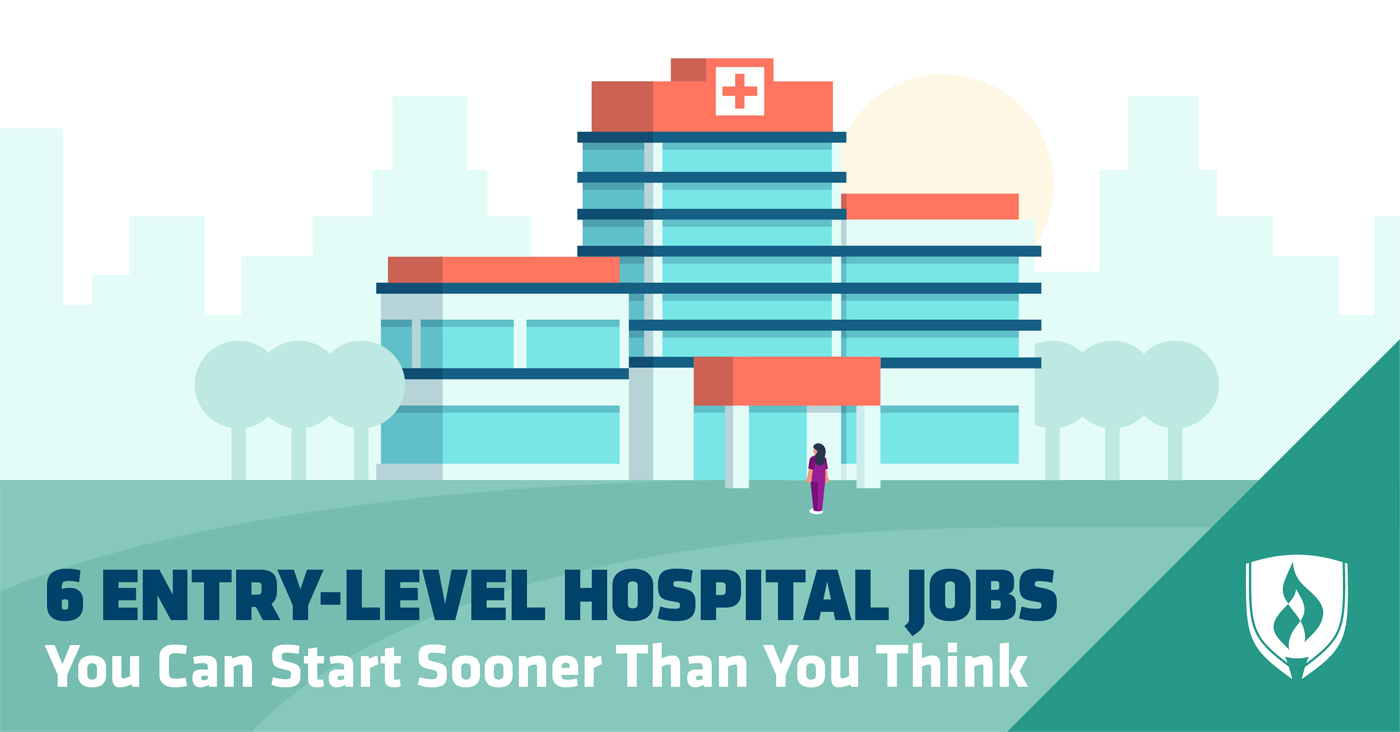You’ve had your eye on a career in the healthcare field for a while now. With employment in healthcare occupations projected to grow by 14 percent through 2028 thanks to an aging baby boomer population, this career field could offer stable job opportunities for dependable workers like you.1

You might think you need an expensive and time-consuming degree to land a healthcare job, but that’s not always the case. There are a handful of entry-level hospital jobs you can get started in with a certificate or diploma. While that doesn’t mean every job posting for these occupations is going to prefer a candidate with limited experience—what employer would?—these positions can be attained with relatively less time spent training or in the college classroom.
6 Entry-level hospital jobs you can start sooner than later
Looking to get started in a healthcare career without earning an Associate’s degree or more? We’ve analyzed over 768,000 hospital job postings seeking candidates with 0–2 years of experience to identify several roles that could make this goal a reality.1 Read on for more about what these roles entail and key career information from the Bureau of Labor Statistics (BLS).
1. Medical assistant (MA)
Projected employment growth (2018-2028): 23 percent2
Medical assistants bring together administrative and clinical work to support physicians as they attend to patients. Administrative duties include scheduling appointments, keeping accurate medical records and coding a patient’s visit for accurate billing to insurance companies.
On the clinical side, MAs work under the direction of a physician to record vital signs, prepare patients for their exams, gather medical history, administer medication and even draw blood. Consider an MA career if you’d enjoy the balance between working behind the scenes and interacting directly with patients each day.
2. Licensed practical nurse (LPN)
Projected employment growth (2018-2028): 11 percent2
Licensed practical nurses work under the supervision of a registered nurse (RN) or physician to perform many of the nursing duties you’re familiar with. They care for patients in settings like hospitals and nursing homes by administering medication, starting IVs, accurately maintaining patient charts, preparing patients for procedures and assisting patients with dressing and bathing.
LPNs do need to complete a Practical Nursing Diploma program to get started, which can be completed in as few as 12 months.3 This entry-level healthcare career is a great option to consider if you want one-on-one time caring for patients.
3. Pharmacy technician
Projected employment growth (2018-2028): 7 percent2
Pharmacy technicians work under the supervision of a pharmacist to prepare medications according to a prescription’s instructions. This includes measuring medications, counting pills and mixing solutions. They must also keep accurate records as well as store patient medications according to their pharmacy’s organizational system.
Beyond preparing medication for patients, pharmacy technicians also assist patients with questions about prescriptions and over-the-counter medications, keep track of stock and order supplies, and process insurance claims. If you enjoy working on a team and have stellar customer service skills, pharmacy technician could be the entry-level hospital job for you.
4. Medical administrative assistant
Projected employment growth (2018-2028): 11 percent or higher2
Medical administrative assistants, also called medical secretaries, are often the first face you see when you enter a clinic or hospital. They greet and check in patients, schedule appointments, answer phones, compile medical records and perform bookkeeping duties.
This entry-level healthcare job is an important one, as medical admin assistants keep patients feeling welcome and comfortable while also ensuring that important messages and paperwork make it into the right hands. If you love helping others but aren’t as interested in direct patient care, becoming a medical admin assistant could be a good option.
5. Certified nursing assistant (CNA)
Projected employment growth (2018-2028): 9 percent2
CNAs work together with a healthcare team to provide basic care to patients. They help patients with bathing and dressing, eating and grooming. CNAs may also assist with moving patients in and out of bed, or transporting them to other rooms or vehicles.
CNAs work closely with patients to ensure their comfort and safety, so they are often the ones reporting a change in a patient’s status to RNs or physicians. They also maintain accurate medical records by recording vital signs and symptoms of a problem in a patient’s chart. If making a daily difference to patients sounds good to you, add CNA to your list of potential entry-level hospital jobs to consider.
6. Phlebotomist
Projected employment growth (2018-2028): 23 percent2
You know phlebotomists as the healthcare workers who draw blood and analyze the results in a lab. These professionals can work in many different settings, from clinics and hospitals to mobile blood drives. Their primary job duties include maintaining accurate records of patients and their blood specimens, ensuring that needles and other medical equipment are properly disposed of and monitoring patients to ensure their safety and comfort during blood or tissue collection.
In the lab, phlebotomists conduct tests on blood and other specimen samples according to physician orders, submit results to doctors for diagnosis, and calibrate and maintain lab equipment. If you like working with people and don’t mind the sight of blood, a career in phlebotomy could be right for you!
These hospital jobs are waiting for you
Entry-level hospital jobs do exist—and they’re out there waiting for you! One of these hospital jobs that doesn’t require an Associate’s or Bachelor’s degree could be your first step into a healthcare career.
Working in a hospital isn’t for everyone, however. Find out whether a hospital is the right setting for launching your healthcare career with our article, “Healthcare Insiders Expose the Pros and Cons of Working in a Hospital.”
Related Articles:
- Health 3.0 and the History of Healthcare
- Nuclear Medicine Technologist vs. Radiologic Technologist: A Clear View of These Diagnostic Imaging Careers
- 7 Hands-on Healthcare Jobs You Can Land Without a Bachelor's Degree
- 5 Jobs Similar to Nursing You Shouldn't Overlook
- The Anatomy of a Healthy Medical Assistant Resume
- Health Information Trends: How Healthcare Data Analytics Can Improve Patient Outcomes
1Burning-Glass.com (analysis of 768,696 hospital job postings seeking candidates with 0-2 years of experience, June 1, 2019 – May 31, 2020)
2Bureau of Labor Statistics, U.S. Department of Labor, Occupational Outlook Handbook, [information accessed May 2020] www.bls.gov/ooh/. Employment conditions in your area may vary.
3Completion time is dependent on the number of transfer credits accepted and the number of courses completed each term.




